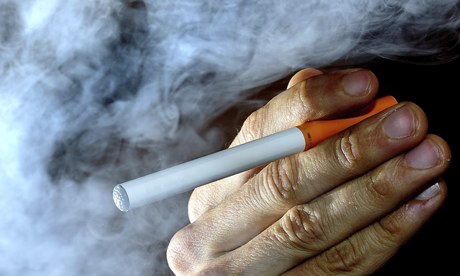
Smoking is cool again. At least, electronically. The electronic cigarette (e-cig, vapouriser, fake fag, digital cancer) is, if you believe the adverts and scare stories in the press, the new black.
No longer happy with the adverse health effects of smoking analogue traditional cigarettes, a large swathe of smokers are hanging up their lighters and picking up little metal sticks loaded with a battery, a metal coil, propylene glycol, glycerine and nicotine.
"In one year, its use has doubled," says Iain Quinn of ILoveVapour.com. "In 2012, there were around 500,000 vapers in the UK. Now there are 1.2 million."
The ubiquity of the digital cigarette is undeniable. As a new convert to vaping – a reference to the smoke-like vapour the unit emits when you suck on it, I seem to find them everywhere. People use them in offices, in bars, on public transport. And, although some quizzical looks are thrown when you puff out a cloud of smoke, faces calm once people realise you're not smoking an actual cigarette.
Since England's smoking ban in 2007, smokers have had to duck out of buildings to get their nicotine fix. Action on Smoking and Health (Ash) estimates that two thirds of the UK's 10 million smokers would like to quit. Medical advice varies from GP to GP, but mine suggested I give e-cigarettes a go after its cousin, the inhalator – a plastic tube filled with a nicotine-soaked sponge – made me feel I was sucking on a tampon.
From 2016, the electronic cigarette will be classed as a medicine. This means it will be regulated by the MHRA and doctors in the NHS will be able to prescribe it to help smokers cut down or quit.
Yet this seeming official acceptance of vaping cannot quell fears that it is not only normalising smoking, but glamorising it. Actress Julia Louis-Dreyfus chuffed on one at the Golden Globes and celebs are papped walking out of bars with them. Advertised as the healthy way to smoke and seeing a gap in the market, companies are now being acquired by tobacco manufacturers that want a stake in the £200m industry – for example, Skycig's acquisition by Lorillard.
Vapour liquid comes in flavours from chocolate to piña colada, leading schools in the US to ban it because they fear it will act as a gateway drug to the real thing.
"Smokers are addicted to the nicotine but it is the smoke that kills them," says Martin Dockrell of Ash. "Nicotine is often part of the solution rather than the problem, and we know that nicotine replacement therapy combined with skilled support makes smokers four times more likely to quit successfully."
For a smoker, the benefits are clear. You can feed – or wean yourself off – your addiction to nicotine. You don't have to inhale the 4,000-7,000 toxins a regular cigarette sends down your throat. It's cheaper. A unit costs a little more than a packet of cigarettes and refills are just over a pound each and claim to have as much nicotine as 20 smokes.
You don't lose the social aspect of cigarette smoking either. Variations in nicotine doses and tastes seem to be an easy topic of conversation from the darkest of Soho members' bars to the rainiest of Hackney bus stops.
There are downsides.
Legal experts, such as Alex Bonner from London's Blake Lapthorn, say it's up to employers to make their own policy decision as to whether or not to allow vaping at work. "Employers have an obligation to provide a safe place of work," says Bonner. "The long-term health implications of the e-cigarette are not yet known, and it has even been suggested that they may not currently meet appropriate standards of safety and quality."
A University of Sterling and Cancer Research UK report on the trend raises questions about the safety of some of the doses of nicotine in some models as well as the propylene glycol used to suspend it.
The report also addressed the issues of corporate power and tobacco companies' actual commitment to harm reduction through their exploration of the e-cigarette market. They have long been trying to push low-tar and "safer" cigarettes. As the cigarette market deteriorates, does their recent investment maintain rather than reduce harm?
"I know a few people who never smoked cigarettes but are now hooked on e-cigs," says Mohammed, a 30-year-old sound engineer. "I've done a few Bengali weddings and even the women are puffing away. It's a cool thing to do."
What happens to discarded e-cigs and refills is also a concern as they contribute to the volume of global e-waste. "How soon will these products end up on the shores of Africa and Asia?" asks Michael Jones of the United Nations' Safe Planet campaign.
The fact remains that we may be moving away from tobacco, but, as long as we have nicotine, we're just finding new ways of dosing up with the drug we're addicted to. And as long as there is demand, someone is going to supply.
Join the community of sustainability professionals and experts. Become a GSB member to get more stories like this direct to your inbox.

